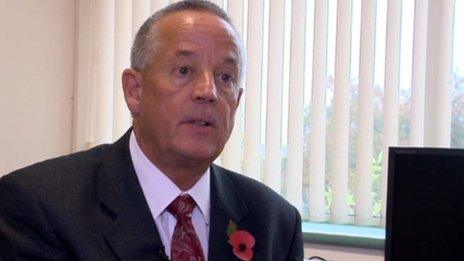Derbyshire police and crime commissioner: 'Crime up due to cuts'
- Published

Police figures show crime was up by 3% from 1 April to 6 November 2013 compared to the same period last year
Derbyshire's police and crime commissioner says crime is rising in the county because of recent government cuts to welfare benefits.
Alan Charles said the problem was affecting areas with high deprivation.
Police figures show crime rose 3% from 1 April to 6 November 2013 compared with the same period last year.
A Department for Work and Pensions (DWP) spokesperson said the welfare reforms provided unconditional support to vulnerable people.
Mr Charles told BBC Sunday Politics East Midlands: "The home secretary is saying that crime is falling even though we've had all the budget cuts. She's wrong; it isn't.
"What we're finding now predominantly in areas of higher deprivation, with the benefit cuts that the government have inflicted on people who are not in work and are claiming benefits etc, crime is starting to go up."
'Simply wrong'
He said crimes such as shoplifting, theft from vehicles and non-domestic burglaries were on the increase.
"One of my commissioner colleagues described these as poverty crimes and I think it's a very good description.
"It's not to say I'm condoning it by any means at all, but it explains why this is happening."
"In Derbyshire crime is up by about 3% compared to what it was last year, now that follows 10 successive years of falling crime."
The force said 32,394 crimes had taken place between 1 April and 6 November 2013 compared with 31,587 in the same period in 2012.
A DWP spokesperson said: "It's simply wrong to try and draw a line between the government's welfare reforms, which are designed to target help on those who need it most, and rates of crime.
"Our changes aim to make work pay, while continuing to offer unconditional support to the most vulnerable in society.
"The government has cut income tax for 25 million people, taking 2.7 million out of income tax altogether, frozen council tax and fuel duty, and will make three million households better off through Universal Credit."
- Published25 January 2013
- Published1 December 2012
- Published16 November 2012